Welcome!
Whatever your purpose in visiting—whether you want to learn more about me or simply have a general interest in the sport of figure skating—I hope you'll find this site useful. Skating has been the centerpiece of my life since I was very young, and I am always excited to share this enduring passion with others.

For those who are thinking about taking up skating, the right place to start is usually through the group classes offered by your local ice arena. Of course, depending on your interests, goals, and level of progress, you may at some point start thinking about taking private lessons. If so, this site is for you.
Whether you are new to private lessons, have just moved into the area, or are thinking of making a switch from your current coach, the goal of this site is to help you make an informed decision. As I explain under Choosing a Coach, there are many factors to consider when deciding who should be your instructor. So the more you know about me and my coaching philosophy and become familiar with the accomplishments of my many incredibly talented students both past and present, the easier it will be to decide if I am the right instructor for you or your child.
Again, thank you for visiting. See you on the ice!

What's Your Interest?
Choose your area(s) of interest from the selections below to learn more.
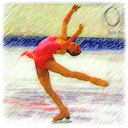
As a former competitive skater and US Figure Skating Gold Medalist in Figures, Free Skating, and Ice Dance, taking dedicated young students and helping them to grow and compete at the highest levels is my greatest thrill. Seeing my students achieve their dreams and become Gold Medalists themselves, tour the world with national and international ice shows, or embrace coaching as a career, is always rewarding and humbling.
The sport of competitive figure skating is governed worldwide by the International Skating Union, and here in the United States by US Figure Skating. The latter body is responsible for the rules of competition as well as the test structure through which all competitive skaters in the U.S. must advance, regardless of whether one's passion focus is free skating, ice dance, pairs, synchronized, or adult skating.
How does one become a "competitive" figure skater? On a personal level, this decision is generally a process. The individual starts out on the ice, usually in group classes, then moves into private lessons and recreational competition. From there, the skater along with his or her coach makes a decision based on the individual's desire, ability, and commitment. Becoming a competitive figure skater requires the skater to become a member of US Figure Skating by joining a local club such as our own Capital City Figure Skating Club. Depending on one's ultimate goal, being a competitive figure skater can require a significant investment of time for practice, training, ice time, and competitions (not to mention money for all of the above and more), but as my own experience and many of my former skaters will surely attest, it can be very rewarding personally.
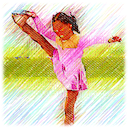
From those first hesitant steps onto the ice to the confident grace of a child joyfully stepping into the spotlight for his or her first exhibition, having a coach who understands how to teach proper technique and develop fundamental skills while ensuring the child's interest and enthusiasm is vital. Whatever your child's goals, more than anything I want to help them embrace skating as a sport they can enjoy throughout their life.
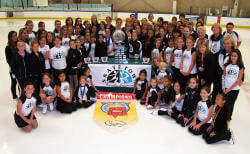
Recreational figure skating often means different things to different people. For some, it simply means striving for a level of comfort and confidence on the ice so as to enjoy the sport for a lifetime. For others, it means learning basic and even advanced techniques, taking tests to measure one's accomplishments, and participating in local, regional, national and even world competitions. For example, in August of 2009, a team of recreational skaters from Roseville — including over 40 of my own students — won the Ice Skating Institute's World Recreational Team Championships in San Jose, California. Out of 64 teams from as far away as Manila and China, our team earned over 400 medals and 1717.5 points to clinch the World title.
Recreational Ice Skating has two distinct and independent governing bodies, the Ice Skating Institute and US Figure Skating (through the Learn to Skate USA program). For simplicity, most arenas follow just one of the two programs, with the ISI's program generally being the larger and more popular of the two, with more opportunities for recreational competition.
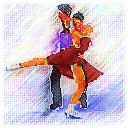
The beauty of Ice Dance is that it is a discipline for all ages. Drawing from the world of ballroom dancing, it requires skill, precision, and grace in the execution of carefully choreographed movements that the skater learns first as a solo dancer before coordinating with a partner. This complex but increasingly popular discipline has both competitive and recreational aspects, and can bring a lifetime of joy to the ice.
Most skaters begin ice dancing by learning the steps of what are known as compulsory, or set pattern ballroom-type dances on their own. They practice and even test individually, gaining comfort with the techniques, movements, and music for each dance. The steps of each dance are different for the male and female skaters, but when danced in pairs fit together perfectly. Ideally, once a skater has learned a given compulsory dance, he or she can partner with any ice dancer of equal or greater level and perform the dance easily.
Ice dancers can compete both individually and as a pair in tests and some non-qualifying competitions, with different tests and standards applied for competitive vs. adult. For the more advanced dancer in qualifying competitions, there are two required events or dances, a Short Dance and a Free Dance. In the Short Dance, each team performs a dance that combines patterns from one of the compulsory dances with their own creative choreography, while incorporating certain required technical elements. In the Free Dance, teams are free to choose their own rhythms, program themes, and music. Competition at this level requires a dedicated partner.
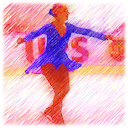
Whether you're returning to the ice after years of being away or just starting out, age is no obstacle in this sport. While some skate for the pure joy of it or for the cardiovascular benefits, others advance through Adult tests, learn to Ice Dance, and prepare to compete at regional and even national adult competitions. Special sessions intended exclusively for more mature skaters can put you at ease among friends in quieter, less frenzied surroundings.
Lessons for adults may be available through your arena's group classes or via private lessons with you chosen coach. Free Skating, dance (solo and partnered) and even pairs skating opportunities are usually available.
I am sometimes asked why a competitive coach like myself teaches adults. The reasons are simple: Working with adults presents a very different set of physical and mental challenges, which by itself makes it interesting and provides variety to my day. Also, every single adult I coach is there because they want to be, whatever the reason, and I know they are pushing themselves harder than I or anyone else could ever push them. And, at the end of the day, it is still about sharing my love of skating with others.
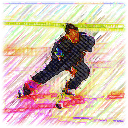
The sports of figure skating and hockey are very different and often at odds as they compete for skaters, ice time, and attention, so it may surprise some that hockey players occasionally take lessons from figure skating coaches. Why? The reason is that both disciplines require power, and even though the skates and the shape of the blades are very different, developing power through proper technique can be key to success in either sport.
Power skating can be taught either individually or as a group. Individual training can be helpful in refining techniques for those who are struggling to develop power throughout their full repertoire of movement. And while my background and focus is on figure skating, I hold a Hockey I & II Accreditation from the Professional Skaters Association (PSA) and have helped many hockey skaters improve their skating technique and in turn their strength, speed, stamina, and explosiveness on the ice.
Featured Video
With this program, "Ne Me Quitte Pas," U.S. Figure Skating Gold Medalist Dasha Kovalenko won the 2018 Crystalline Classic in Santa Rosa, the 2018 Gold Rush in Roseville, and was recalled at the 2018 Spring Jubilee in San Jose.
Congratulations, Dasha!
